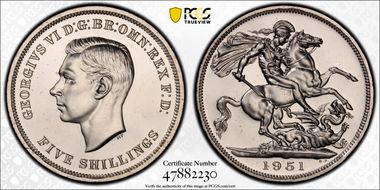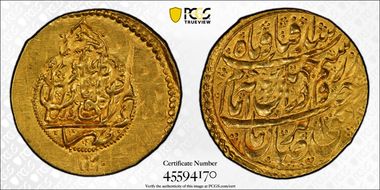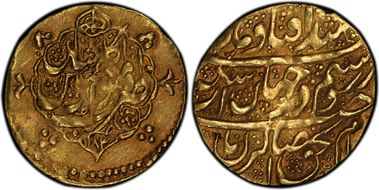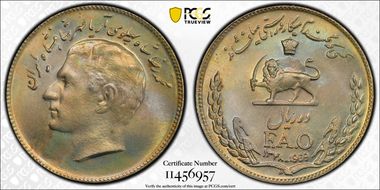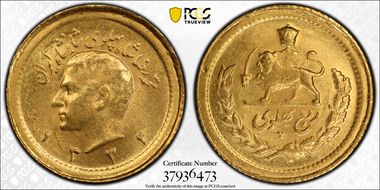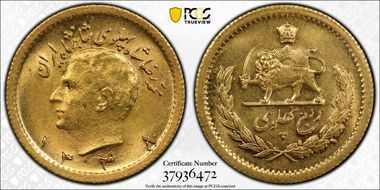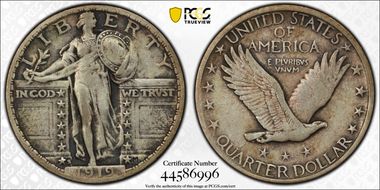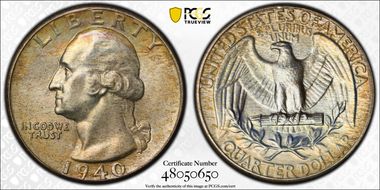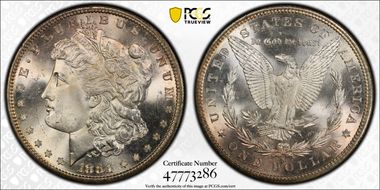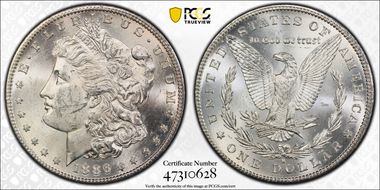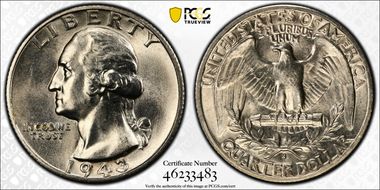Zandion 的钱币相册
This high-grade example is from the earlier Roosevelt Dime series. It features a strong strike, no distracting marks, and shows no wear. Though the edges display some brown toning and it lacks full torch details, it remains an excellent specimen for a registry collection. As a relatively common issue with millions minted, hundreds of thousands are expected to survive in brilliant uncirculated grade.
This high-grade example is from the earlier Roosevelt Dime series. It features a strong strike, no distracting marks, and shows no wear. Though the edges display some brown toning and it lacks full torch details, it remains an excellent specimen for a registry collection. As a relatively common issue with millions minted, hundreds of thousands are expected to survive in brilliant uncirculated grade.
The Franklin Series, though somewhat overlooked, is gaining renewed interest as the last silver half dollar series from the United States Mint. This particular example is in excellent condition, graded MS 65, featuring impressive luster and eye appeal. The main imperfections are bag marks, primarily on the reverse at the high points of the bell. The strike presents another minor issue, as the bell lines aren't fully visible—hence the missing FBL designation. While higher-grade Franklin Issues are scarce, the estimated survival rate of only 9,000 in MS 65 seems unusually low for a mid-century, common date coin. Overall, this attractive piece complements my collection, adding a PCGS-certified version alongside my NGC-certified example.
The Franklin Series, though somewhat overlooked, is gaining renewed interest as the last silver half dollar series from the United States Mint. This particular example is in excellent condition, graded MS 65, featuring impressive luster and eye appeal. The main imperfections are bag marks, primarily on the reverse at the high points of the bell. The strike presents another minor issue, as the bell lines aren't fully visible—hence the missing FBL designation. While higher-grade Franklin Issues are scarce, the estimated survival rate of only 9,000 in MS 65 seems unusually low for a mid-century, common date coin. Overall, this attractive piece complements my collection, adding a PCGS-certified version alongside my NGC-certified example.
This is a nice example of a common date Morgan Dollar. Light toning appears along the top edge of the obverse and bottom of the reverse. Both sides show some defects and chatter on the high points of the reliefs and fields. The strike is strong, displaying good detail throughout. This specimen has earned a place in my collection due to its unusual purple certification holder and label.
This is a nice example of a common date Morgan Dollar. Light toning appears along the top edge of the obverse and bottom of the reverse. Both sides show some defects and chatter on the high points of the reliefs and fields. The strike is strong, displaying good detail throughout. This specimen has earned a place in my collection due to its unusual purple certification holder and label.
The 1880/79 overdate is one of the more popular varieties within the Morgan series and is fairly rare in higher uncirculated grades, with only about 1,000 surviving specimens. This example is a fantastic-looking coin. It features great details and an excellent strike, with little to no distracting marks—especially on the reverse—and outstanding eye appeal. The coin is blast white with strong mint luster and no unattractive toning. This particular example is housed in a specialized holder with a special label, which is unusual for this type of coinage. I'm thrilled to add this piece to my personal collection.
The 1880/79 overdate is one of the more popular varieties within the Morgan series and is fairly rare in higher uncirculated grades, with only about 1,000 surviving specimens. This example is a fantastic-looking coin. It features great details and an excellent strike, with little to no distracting marks—especially on the reverse—and outstanding eye appeal. The coin is blast white with strong mint luster and no unattractive toning. This particular example is housed in a specialized holder with a special label, which is unusual for this type of coinage. I'm thrilled to add this piece to my personal collection.
This is an average uncirculated example of a common Morgan series issue. Hundreds of thousands of specimens are estimated to survive in uncirculated grades. The coin features a strong strike with well-defined relief details. While some original mint luster remains, it's not as prominent as seen in higher grades. The main issues are surface defects and chatter on both sides, with a notable mark above the eyebrows on the obverse. I added this coin to my personal collection primarily because of its unusual purple PCGS holder and label—a rare combination for this grading service.
This is an average uncirculated example of a common Morgan series issue. Hundreds of thousands of specimens are estimated to survive in uncirculated grades. The coin features a strong strike with well-defined relief details. While some original mint luster remains, it's not as prominent as seen in higher grades. The main issues are surface defects and chatter on both sides, with a notable mark above the eyebrows on the obverse. I added this coin to my personal collection primarily because of its unusual purple PCGS holder and label—a rare combination for this grading service.
The major issue with this example is the distracting marks, particularly on the obverse, which are visible in the bright fields. The strike is very strong, showing great detail on both the obverse and reverse. The 1886 issue is fairly common, with close to a million specimens expected to exist in uncirculated condition. This piece has the unusual purple core and label from PCGS, which is why I'm adding it to my personal collection.
The major issue with this example is the distracting marks, particularly on the obverse, which are visible in the bright fields. The strike is very strong, showing great detail on both the obverse and reverse. The 1886 issue is fairly common, with close to a million specimens expected to exist in uncirculated condition. This piece has the unusual purple core and label from PCGS, which is why I'm adding it to my personal collection.
This is a fine example from the Morgan Series. The strike is strong, showing nearly all details clearly. The fields are bright white with good mint luster, though faint toning is beginning to appear at the edges. There are minimal distracting marks in the fields, though some are visible on the high points. The coin is housed in an unusual purple PCGS holder with matching label. While this is a relatively common issue, it represents a nice average uncirculated Morgan Dollar.
This is a fine example from the Morgan Series. The strike is strong, showing nearly all details clearly. The fields are bright white with good mint luster, though faint toning is beginning to appear at the edges. There are minimal distracting marks in the fields, though some are visible on the high points. The coin is housed in an unusual purple PCGS holder with matching label. While this is a relatively common issue, it represents a nice average uncirculated Morgan Dollar.
This 1923 Peace Dollar replaces a lower-grade uncirculated example in my collection. The specimen exhibits qualities typical of higher-grade dollars—bright white fields, no wear, strong strike, and minimal distracting marks. There is some unusual yellowing, likely due to the older holder. Despite being one of the more common Peace Dollar issues, this is an good addition to my personal collection.
This 1923 Peace Dollar replaces a lower-grade uncirculated example in my collection. The specimen exhibits qualities typical of higher-grade dollars—bright white fields, no wear, strong strike, and minimal distracting marks. There is some unusual yellowing, likely due to the older holder. Despite being one of the more common Peace Dollar issues, this is an good addition to my personal collection.
The first modern commemorative silver dollar minted, this particular issue is somewhat simplistic and follows the aesthetic of the time period. This example is close to perfect, with mirror fields and strong details on the reliefs, but it does have some minor flaws, including the beginning of some cloudy toning on the reverse. This particular example is encapsulated in a purple PCGS holder and label—unusual for the grading service.
The first modern commemorative silver dollar minted, this particular issue is somewhat simplistic and follows the aesthetic of the time period. This example is close to perfect, with mirror fields and strong details on the reliefs, but it does have some minor flaws, including the beginning of some cloudy toning on the reverse. This particular example is encapsulated in a purple PCGS holder and label—unusual for the grading service.
Earlier modern commemorative issues rarely achieved perfect grades, and this example follows that pattern. While the strike is perfect with good relief details, there are some minor defects, especially on the obverse. Though most of the coin appears as pristine as any modern proof, some toning has begun to develop. It is encapsulated in PCGS's distinctive purple holder and label, which differs from their standard certification style.
Earlier modern commemorative issues rarely achieved perfect grades, and this example follows that pattern. While the strike is perfect with good relief details, there are some minor defects, especially on the obverse. Though most of the coin appears as pristine as any modern proof, some toning has begun to develop. It is encapsulated in PCGS's distinctive purple holder and label, which differs from their standard certification style.
A relatively unremarkable modern commemorative example. It's close to perfect but has some minor flaws that keep it from achieving the top grade. I'm adding this piece to my collection due to the unusual purple holder and label from PCGS.
A relatively unremarkable modern commemorative example. It's close to perfect but has some minor flaws that keep it from achieving the top grade. I'm adding this piece to my collection due to the unusual purple holder and label from PCGS.
This 1989 Congress Bicentennial Half Dollar, while not exceptional in grade, holds a unique place in my collection due to its special purple holder and label—an unusual feature for PCGS-graded coins. Despite its ordinary condition, this issue remains one of my favorite modern commemoratives. The reverse, featuring the façade of the U.S. Capitol building, is particularly impressive, especially considering it's an early example from the modern commemorative series.
This 1989 Congress Bicentennial Half Dollar, while not exceptional in grade, holds a unique place in my collection due to its special purple holder and label—an unusual feature for PCGS-graded coins. Despite its ordinary condition, this issue remains one of my favorite modern commemoratives. The reverse, featuring the façade of the U.S. Capitol building, is particularly impressive, especially considering it's an early example from the modern commemorative series.
A perfect example of an American Silver Eagle. This specimen displays the beginning of orange toning around the coin's edge, particularly on the obverse. The coin is housed in a PCGS St. Gaudens holder—an unusual label for a common modern issue that I haven't encountered before.
A perfect example of an American Silver Eagle. This specimen displays the beginning of orange toning around the coin's edge, particularly on the obverse. The coin is housed in a PCGS St. Gaudens holder—an unusual label for a common modern issue that I haven't encountered before.
This Type 1 American Silver Eagle is a perfect specimen, though it has begun developing "milk spots" on both the obverse (near the sun) and reverse (near the stars). I've added it to my collection primarily for its unique Presidential labels on the holder—a particularly relevant feature as of January 2025.
This Type 1 American Silver Eagle is a perfect specimen, though it has begun developing "milk spots" on both the obverse (near the sun) and reverse (near the stars). I've added it to my collection primarily for its unique Presidential labels on the holder—a particularly relevant feature as of January 2025.
A perfect example of the 2019 American Silver Eagle Series. The specimen shows no visible flaws, featuring dark mirror-like fields with strong relief details. It retains complete mint luster without any toning or milk spots. While this is a fairly common issue, it remains a beautiful example. This specimen is part of the Fun Show Scroll Thomas S. Cleveland hand-signed series, encapsulated by PCGS.
A perfect example of the 2019 American Silver Eagle Series. The specimen shows no visible flaws, featuring dark mirror-like fields with strong relief details. It retains complete mint luster without any toning or milk spots. While this is a fairly common issue, it remains a beautiful example. This specimen is part of the Fun Show Scroll Thomas S. Cleveland hand-signed series, encapsulated by PCGS.
Another perfect example of the American Silver Eagle Series from 2020—the last year of the original design. The coin features perfect mirror fields, strong relief details, and no visible defects or distracting marks. Its mint luster remains pristine, with no toning present. This particular specimen is part of the AIP signature series from PCGS, signed by Thomas Cleveland.
Another perfect example of the American Silver Eagle Series from 2020—the last year of the original design. The coin features perfect mirror fields, strong relief details, and no visible defects or distracting marks. Its mint luster remains pristine, with no toning present. This particular specimen is part of the AIP signature series from PCGS, signed by Thomas Cleveland.




















